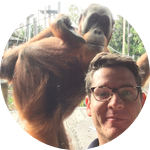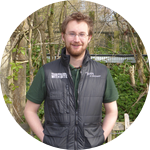About This Project
Many predators have complex, unpredictable hunting behaviours, which we believe can be promoted in captive situations by using high tech environmental enrichment. At our ZooJam in November (a multi-disciplinary workshop), we designed such enrichment for sea lions, penguins and large cats. Now, with your help, we're ready to start building and testing prototypes
Ask the Scientists
Join The DiscussionWhat is the context of this research?
Animals’ well-being is an important concern for modern zoos, and for zoo visitors. Many zoos worldwide are searching for novel ways to enrich the lives of captive animals.
Enabling captive animals to experience their natural predatory and avoidance behaviours is an interesting challenge for zoos, and one that is significant given that many zoos’ collections include predators (such as big cats) due to their popular appeal. Aspects of the hunt are difficult to stimulate without live prey (which may be illegal and poses its own welfare concerns).
However, digital technology has the potential to facilitate complex and unpredictable environmental enrichment, which extends its welfare impact by enabling predators to express their natural behaviours.
What is the significance of this project?
Zoos have an important role in preserving species that are already going extinct or endangered, researching species to contribute to conservation, educating the public about wild species and fostering community involvement in conservation efforts.
Enrichment that motivates natural behaviours is an integral part of animal welfare as it helps maintain an animal's physical and psychological well-being, which in turn makes it an exemplar for observational research and public interest.
If zoo visitors can watch predators behaving naturally, their visits will be engaging and fulfil the zoo's mission to educate and raise public awareness. If zoo visitors can also experience a virtual hunt, their understanding of the animal's behaviour will be more profound.
What are the goals of the project?
At the ZooJam design workshop in November 2016, we worked with briefs for sea lions, penguins and big cats, identifying clear, species-specific enrichment goals. These informed a set of draft design specifications for novel environmental enrichment experiences, targeting the zoo-housed species and also their visitors.
The next stage will be for an interdisciplinary team to develop the first prototype enrichment device for one of the species, and a parallel interactive experience for human visitors. These systems will be evaluated "in the field" with zoo collaborators, to develop new knowledge about the design of enrichment for predators.
Budget
We ran a one-day workshop for zoo professionals, game designers and tech researchers to design tech-based enrichment for predators in zoos.
The subsequent manufacture of prototypical devices will be our main resource challenge. Early prototypes are critical for getting design input from animals (observing interactions with the device) and humans, which leads to new knowledge on designing enrichment for a specific species.
Testing new technology in zoo settings places considerable demands on keepers. An early prototype may lead to important knowledge but provide little direct benefit for zoo personnel. We therefore wish to be able to offer zoo collaborators a small honorarium or donation to their animal enrichment program.
Endorsed by
Meet the Team
Team Bio
We are an international and multi-disciplinary team of interaction design specialists, enrichment professionals, computer scientists and game developers. Our shared interests in animal welfare and creative system design have brought us together for this project.
Fiona French
Fiona is course leader for BSc Computer Games Programming at London Metropolitan University and has organised many gamejams and other play related public events. Her research interests include Animal Computer Interaction, physical computing and toy and game design and development. She is currently investigating the design of playful interactive systems for elephants, as part of a PhD in the Animal Computer Interaction Lab at The Open University.
Mark Kingston Jones
Mark Kingston Jones has been involved in the animal welfare field since 2004. He is a Workshop Coordinator and Level 1 Instructor for The Shape of Enrichment. In addition to running over 25 of his own Student Environmental Enrichment Courses, in the UK, he has been an Instructor on 17 SHAPE workshops and 2 others, in the UK, Indonesia, South Africa, Romania, Russia, Lithuania, Uganda, Vietnam, Armenia, India and Croatia. Previous to becoming self-employed in 2014, he worked at Howletts and Port Lympne Wild Animal Parks, as ‘Head of Education and Research’. In addition to organizing talks, workshops and conferences he has organized over 75 enrichment team building workshops, as well as working with keepers to design and implement enrichment ideas. Mark is the SHAPE-UK & Ireland Events Co-Coordinator, an Honorary Research Fellow at the University of Kent, and a Trustee for Lakeview Monkey Sanctuary. He has been an author on 13 papers and presented 37 talks at conferences, both nationally and internationally.
David Schaller
David is the Principal of Eduweb, an award winning developer of learning games and simulations, based in Minnesota, USA. Dave has over twenty-five years of experience in natural history and social science interpretation, working in print, exhibit, and digital media.Since 1996, he has developed over 200 digital games and interactives about science, art, and history. As a Principal Investigator on the WolfQuest project, he worked with biologists, zoo curators, and educators to design a scientifically-accurate game about wolf ecology. He holds a B.A. in Humanities from Macalester College and an M.A. in Geography and Museum Studies from the University of Minnesota.
Sarah Webber
Sarah Webber is a PhD candidate at the Microsoft Research Centre for Social Natural User Interfaces at the University of Melbourne. Her PhD research examines the use, design and evaluation of digital technology for animal-human encounters at the zoo. She has a professional and academic background in interaction design, user research and user-oriented technology evaluation.
Project Backers
- 8Backers
- 13%Funded
- $374Total Donations
- $46.75Average Donation






